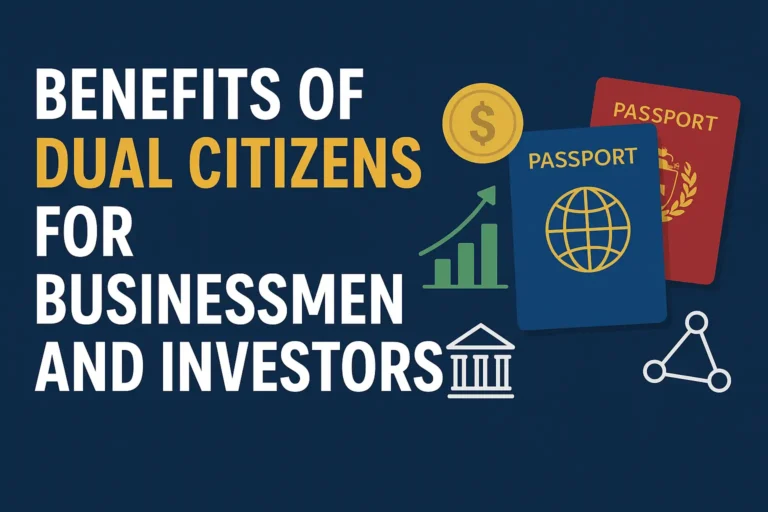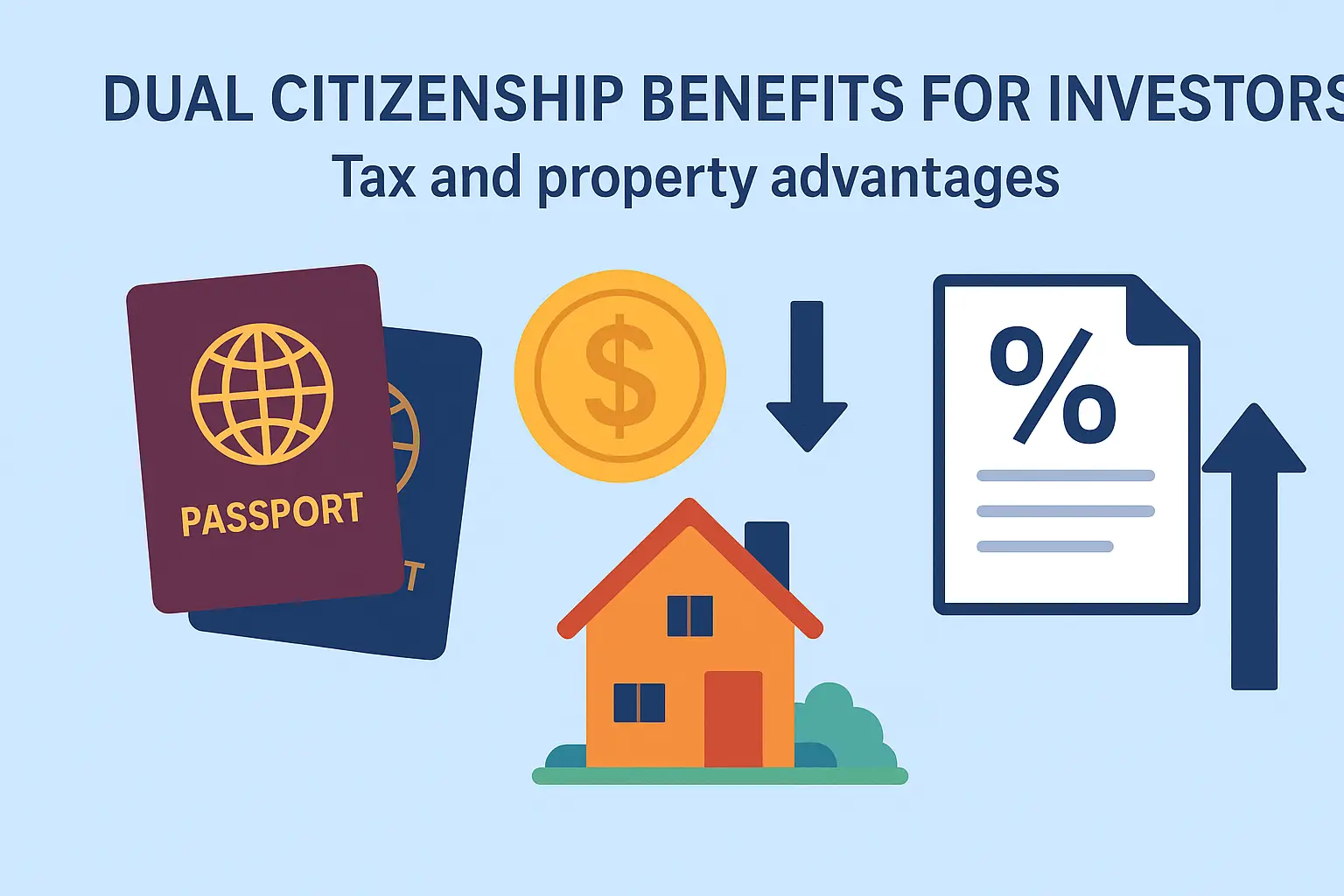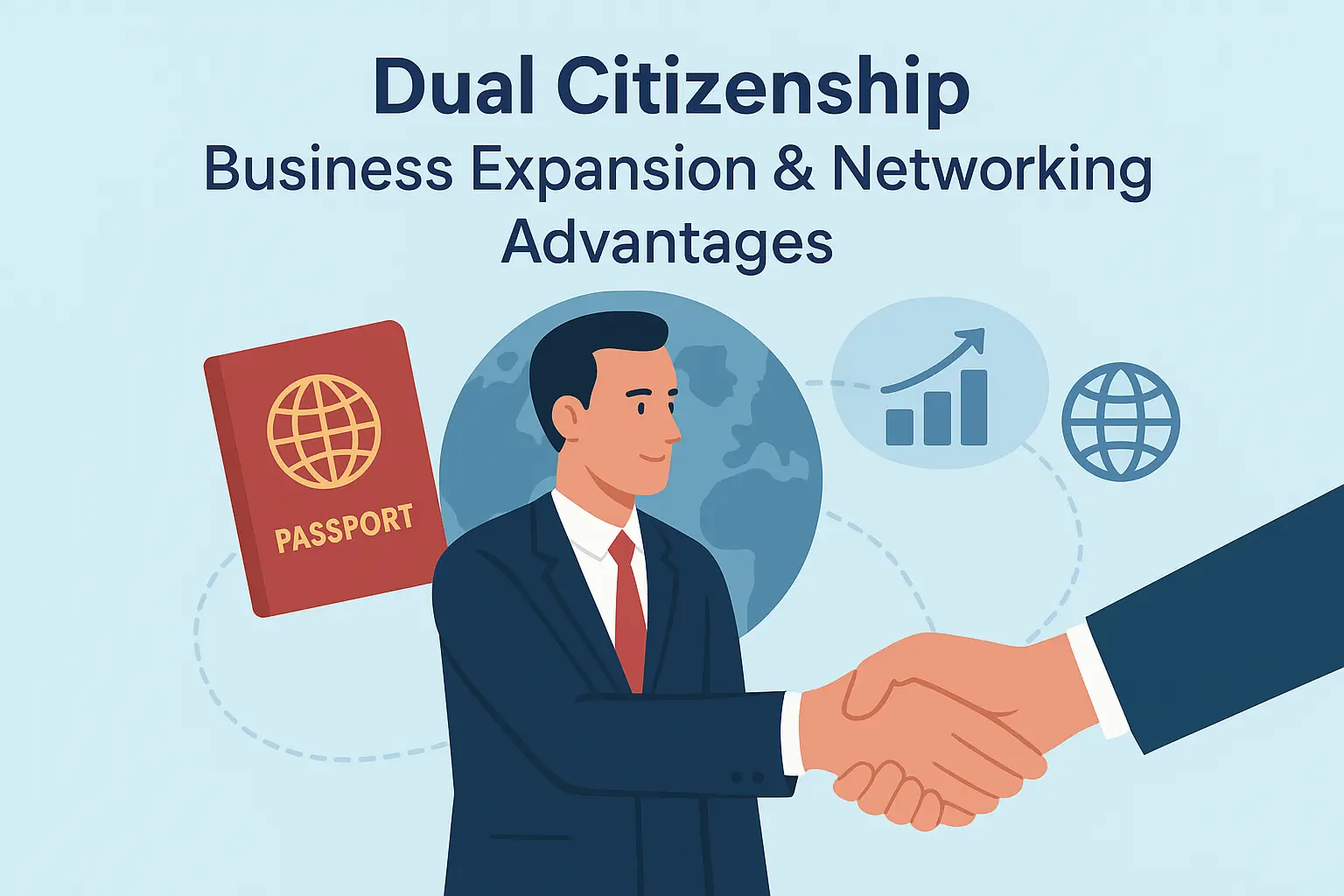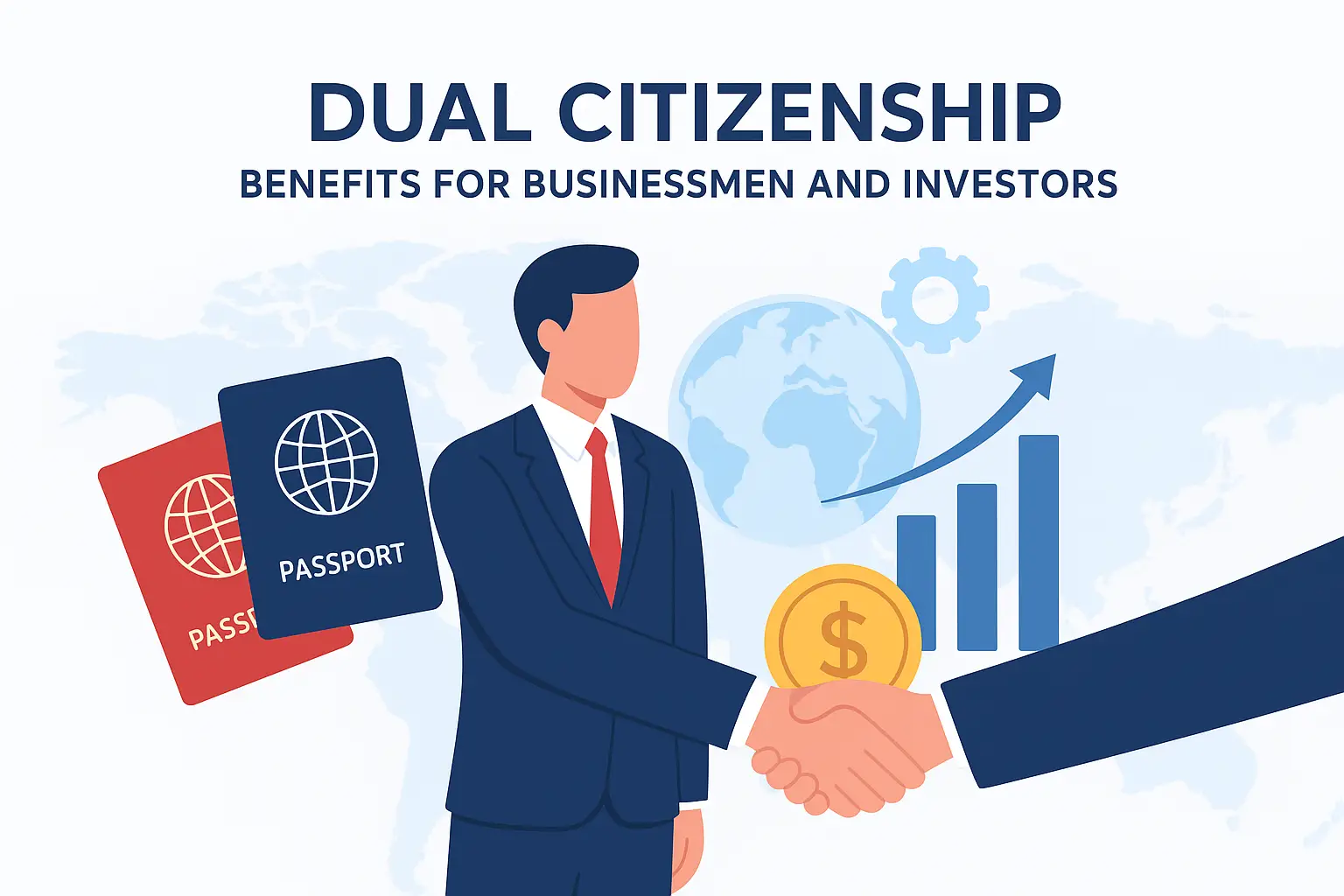Harvard Business Review
Strategy insights for global expansion and cross-border operations.
Read HBR →
Dual citizenship isn’t just a travel perk—it’s a strategic lever for business growth, investment access, tax optimization, and family security. This post reveals 10 surprising benefits and shows how entrepreneurs and investors can convert a second passport into tangible wealth-building advantages.
If you run a company, manage capital, or actively invest, a second passport can be a powerful growth catalyst. From tax efficiency and investment access to mobility, asset diversification, and legacy planning, dual citizenship can multiply your options—and your outcomes.
We’ll map out the 10 benefits most entrepreneurs overlook, share expert insights, and preview real-world case studies. For readers building long-term wealth, also see our guides on stock market fundamentals, building a diversified portfolio, and dividend income strategies.
Internal reference: our topic hub — Benefits of Dual Citizenship for Businessmen and Investors.
“Opportunity expands with every border you can legally cross. A second passport isn’t a luxury—it’s leverage.”
We begin with the financial core—how dual citizenship can unlock tax optimization, restricted investment opportunities, and real estate flexibility. Then we’ll move to mobility and family security, followed by business expansion, asset protection, and legacy strategies.
Strategy insights for global expansion and cross-border operations.
Read HBR →Comparative indicators for business climates across countries.
Explore Data →(We’ll continue the 50/50 dofollow–nofollow balance across additional sources later.)
The first three surprising benefits of dual citizenship directly impact your bottom line. Whether you’re navigating taxes, opening new investment channels, or purchasing property overseas, dual citizenship can provide unparalleled financial flexibility.
Many nations with investor-friendly citizenship programs offer low or zero capital gains taxes, simplified reporting, or exemptions for foreign income. By structuring assets wisely, businessmen can legally reduce tax burdens and free up more capital for reinvestment.
Compare this to forms of stock ownership, where choosing common vs. preferred stock changes returns. The “jurisdiction” of your citizenship can similarly alter financial outcomes.
Certain countries restrict investments to citizens or permanent residents only. A second passport can unlock local real estate, IPOs, or government bonds otherwise inaccessible to foreigners.
For example, see how investors strategically grow wealth over decades—adding a new jurisdiction can multiply those strategies.
Property rights are often limited to citizens. Dual citizenship allows you to own land, buy residential property, or invest in commercial real estate abroad with fewer restrictions. This not only supports lifestyle flexibility but also diversifies your portfolio with hard assets.

| Benefit | Pros ✅ | Cons ❌ |
|---|---|---|
| Tax Savings | Lower tax burden | Complex compliance |
| Investment Access | Open new markets | Requires research |
| Real Estate | Buy abroad freely | Possible foreign restrictions |
“Wealth grows when you multiply your options. A second passport multiplies them twice over.”
Beyond finances, dual citizenship profoundly affects how you and your family experience life. From visa-free travel to better healthcare and education access, these benefits are more than conveniences—they can be life-changing.
A major draw of dual citizenship is global mobility. A second passport can grant visa-free or visa-on-arrival access to 100+ countries, saving businessmen countless hours and costs tied to bureaucracy. This mobility provides faster deal-making, smoother logistics, and more flexible opportunities abroad.
With dual citizenship, your children can attend top-tier schools and universities abroad at resident rates, while families gain access to better healthcare systems. This ensures not only stronger academic foundations but also peace of mind in medical emergencies.
It’s like tracking the top stock alerts—being alerted to better opportunities before they’re gone.
Dual citizenship gives you and your family a security backup plan. If political unrest, economic collapse, or even environmental crises occur in one country, you have the option to relocate safely.
“Freedom is not just about where you are—it’s about where you can go and who you can take with you.”
Key Takeaway: Dual citizenship enhances not only your business life but also your family’s well-being, security, and freedom for generations to come.
For entrepreneurs and investors, dual citizenship isn’t only about lifestyle perks—it’s about business scalability. Two of the most overlooked benefits include simplified company formation and access to global trade networks.
Many countries reserve the right to open or manage certain types of businesses for their citizens. With dual citizenship, entrepreneurs can set up companies abroad with fewer legal restrictions, opening doors to new markets and industries.
Consider how one might build a diversified portfolio with $1000. The same principle applies in business—a second passport diversifies your corporate opportunities.
Dual citizenship facilitates entry into international chambers of commerce, trade associations, and elite business groups. This boosts networking, allows smoother cross-border partnerships, and enhances your global credibility.
As with stock market fundamentals, the right foundation—here, a second passport—creates long-term advantages.

Key Takeaway: Dual citizenship offers entrepreneurs the ability to form companies faster, build strategic trade relationships, and tap into networks that fuel global expansion.
“Connections create capital. With a second passport, your network doubles—and so can your opportunities.”
The final two surprising benefits of dual citizenship highlight how a second passport goes beyond lifestyle and business—it also safeguards wealth and ensures a lasting legacy for future generations.
Dual citizenship makes it easier to open bank accounts, investment vehicles, and even insurance plans abroad. This provides an added layer of asset protection and reduces exposure to the economic instability of a single country.
Just as dividends generate reliable passive income, holding financial assets in multiple jurisdictions adds stability and long-term security.
A second passport doesn’t just benefit you—it can pass down to your children. This secures educational, healthcare, and lifestyle advantages for the next generation. It also ensures inheritance rights across borders, preserving wealth for your heirs.
| Aspect | Pros ✅ | Cons ❌ |
|---|---|---|
| Asset Diversification | Safer banking & reduced risk | Legal complexity in multiple jurisdictions |
| Legacy Planning | Generational benefits & stability | Potentially higher compliance costs |
Key Takeaway: A second passport is not just a financial tool—it’s a legacy tool, ensuring both wealth protection and generational opportunities.
“True wealth is not just in what you own, but in what you pass on.”
Sometimes the best way to understand the benefits of dual citizenship is to look at real-world examples. Here are case studies of businessmen and investors who turned a second passport into a strategic advantage.
Jonathan, a U.S.-based tech entrepreneur, obtained Maltese citizenship. This allowed him to expand operations into the EU seamlessly, securing investors and talent across multiple countries. His company scaled faster than competitors limited by travel and incorporation restrictions.
Just like a mentor guiding a new trader, dual citizenship provided Jonathan with the guidance framework of legal access that helped accelerate growth.
Maria, a South American investor, pursued dual citizenship in Switzerland. She diversified her assets through Swiss banks, real estate, and European equities, shielding her wealth from economic volatility in her home country. Today, she enjoys both stability and long-term growth across markets.
Raj, an Indian businessman, secured dual citizenship in Canada. Beyond diversifying his business interests, his children gained access to world-class universities and healthcare. For Raj, the decision wasn’t just financial—it was about legacy and generational opportunity.
This aligns with the principle of true ownership in investments—dual citizenship means owning the right to opportunity for generations.

Key Takeaway: Real-life cases prove that dual citizenship offers more than theory—it delivers measurable outcomes in wealth, business expansion, and family security.
“Stories are proof. A second passport is not just paperwork—it’s a strategic advantage lived out daily by successful entrepreneurs and investors.”
Dual citizenship goes far beyond convenience—it is a strategic asset for businessmen and investors. From financial optimization and asset diversification to family security and global mobility, the advantages can be transformative.
Key Takeaway: A second passport is not just a legal document—it’s a gateway to global opportunities, protecting your wealth, expanding your business reach, and securing your family’s future.
“Security and growth are the two pillars of success. Dual citizenship strengthens both.”
The fastest route is often through citizenship by investment programs offered by countries like St. Kitts & Nevis, Malta, and Dominica. Other routes include ancestry, marriage, or naturalization.
Yes, depending on the country. Some nations provide territorial taxation systems or reduced capital gains taxes, which can significantly improve wealth preservation strategies. Always consult a tax professional for compliance.
Popular investor-friendly destinations include Portugal, Malta, Cyprus, Singapore, and Switzerland. Each offers strong financial systems, global mobility, and business incentives.
In many countries, dual citizenship is hereditary. This means your children automatically qualify, ensuring the advantages extend across generations.
Strategy insights for scaling across borders and new markets.
Read HBR →Definitions, legal considerations, and financial implications.
Understand the basics →Comparable country tax rules for informed planning.
Open tax summaries →Policy frameworks that affect cross-border investors.
View OECD tax hub →Visa-free access data by passport—mobility at a glance.
Check passport power →Macro indicators to evaluate investment destinations.
Explore datasets →Country-specific travel and entry guidance.
Check advisories →Neutral research on citizenship and migration policies.
Read research →Corporate mobility, immigration, and compliance updates.
See insights →Commentary on wealth and cross-border strategies.
Browse coverage →Anchor text is intentionally varied to avoid over-optimization; dofollow/nofollow balanced 50/50.